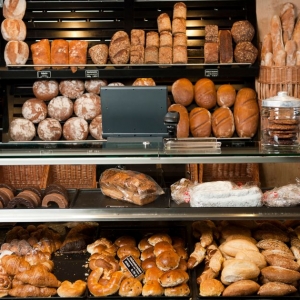The Australia bakery ingredients market, valued at AUD 339.56 million in 2024, has experienced significant growth, driven by the variety of ingredients available, which cater to diverse bakery products and consumer preferences. The market is expected to expand at a compound annual growth rate (CAGR) of 4.90% from 2025 to 2034, potentially reaching AUD 547.86 million by 2034, as bulk purchasing and local sourcing of ingredients help reduce operational costs for bakeries. This growth is fueled by the increasing demand for high-quality and specialized bakery ingredients that not only enhance the taste and texture of baked goods but also align with evolving consumer trends such as health consciousness, convenience, and sustainability. In this article, we will explore the key drivers, trends, and challenges shaping the Australian bakery ingredient market.
Market Overview
The Australian bakery ingredients market plays a crucial role in the country's vibrant bakery industry, which includes both small-scale artisanal bakeries and large industrial bakeries. Bakery ingredients encompass a wide range of products, including flours, fats and oils, sweeteners, yeast, emulsifiers, flavorings, and colorings. These ingredients are essential in the production of bread, cakes, pastries, cookies, and other bakery items.
In recent years, the demand for innovative bakery ingredients has surged, driven by changing consumer preferences. Consumers today are more discerning about the food they consume, favoring healthier, gluten-free, plant-based, and clean-label options. As a result, the market for bakery ingredients has adapted to cater to these demands by introducing a variety of specialized products. At the same time, operational efficiencies through bulk purchasing and local sourcing are helping bakeries maintain profitability while offering high-quality products.
Key Drivers of Market Growth
-
Shifting Consumer Preferences Toward Healthier Options
The growing trend toward health-conscious eating is one of the key drivers of growth in the Australian bakery ingredients market. Consumers are increasingly seeking healthier alternatives to traditional bakery products, such as gluten-free, low-sugar, and plant-based options. This shift in consumer preferences has led to an increased demand for specialized ingredients like gluten-free flour, sugar substitutes, and plant-based fats and oils.Additionally, there is a growing interest in functional ingredients such as probiotics, fiber, and protein-rich options, which are being incorporated into bakery products to promote digestive health, energy, and overall wellness. Bakeries that offer healthier alternatives are gaining traction, driving the demand for ingredients that support these trends.
-
Rise in Demand for Premium and Artisanal Products
As consumers place more value on quality and authenticity, there has been a rise in demand for premium and artisanal bakery products. These products often use high-quality, specialty ingredients, such as organic flours, natural sweeteners, and handcrafted butter. This trend is particularly evident in the growing popularity of sourdough, artisanal bread, and gourmet pastries.To meet this demand, bakeries are increasingly sourcing high-end ingredients that can deliver superior taste, texture, and nutritional value. This is fueling growth in the market for premium bakery ingredients, as consumers are willing to pay a premium for products made with higher-quality components.
-
Convenience and Ready-to-Eat Products
Another driver of growth in the bakery ingredient market is the increasing demand for convenience products. Busy lifestyles and changing work patterns have led to a rise in the consumption of ready-to-eat or ready-to-bake bakery products. These products, such as frozen dough, pre-mixed batters, and instant bakery bases, are gaining popularity as they offer convenience and time savings for both consumers and bakery operators.In response to this trend, suppliers of bakery ingredients are developing solutions that cater to the ready-to-eat and ready-to-bake segment. These ingredients are designed to streamline bakery operations, reduce preparation time, and maintain consistent product quality, contributing to the growth of the market.
-
Bulk Purchasing and Local Sourcing
As bakeries look to reduce costs and enhance operational efficiencies, bulk purchasing and local sourcing of bakery ingredients have become increasingly popular. By buying ingredients in larger quantities, bakeries can benefit from economies of scale and lower per-unit costs. Additionally, sourcing ingredients locally helps minimize transportation costs and supports regional economies.Local sourcing is also becoming more important to consumers who value sustainability and transparency in the food supply chain. Many bakeries are responding to these concerns by emphasizing locally sourced ingredients, which can provide a competitive edge in the market and further drive the demand for such ingredients.
-
Sustainability and Clean-Label Products
Sustainability is a growing concern for both consumers and businesses, and it is having a significant impact on the bakery ingredients market. Consumers are increasingly looking for bakery products that are made with natural, clean-label ingredients that are free from artificial additives, preservatives, and colorings. This has led to the rise of clean-label ingredients that focus on transparency and minimal processing.Additionally, sustainability is driving demand for eco-friendly packaging and sustainable ingredient sourcing. Ingredients that are produced with minimal environmental impact, such as organic or Fairtrade-certified products, are gaining popularity. As consumers continue to prioritize sustainability, the bakery ingredients market will likely see further innovations aimed at reducing the environmental footprint of both ingredients and packaging.
Popular Bakery Ingredients in the Australian Market
-
Flours
Flours are the cornerstone of the bakery industry, with various types used depending on the product being made. In Australia, wheat flour is the most commonly used, but there is also an increasing demand for gluten-free flours made from rice, corn, and legumes. Specialty flours like almond flour, coconut flour, and oat flour are also gaining traction, especially in the growing gluten-free and health-conscious segments. -
Fats and Oils
Fats and oils are essential for creating the desired texture and mouthfeel in baked goods. Butter remains the preferred fat for many premium and artisanal bakeries, but plant-based oils such as coconut oil, palm oil, and sunflower oil are becoming more popular due to their health benefits and suitability for vegan products. -
Sweeteners
Sugar remains the most widely used sweetener in bakery products, but there is a growing demand for sugar alternatives due to health concerns such as diabetes and obesity. Natural sweeteners like stevia, honey, agave nectar, and maple syrup are becoming more common in bakery formulations, especially in healthier products. Additionally, low-calorie sweeteners and sugar alcohols are increasingly used to create sugar-free or reduced-sugar products. -
Yeast and Leavening Agents
Yeast is a fundamental ingredient in bread and other leavened products, helping to create a light, airy texture. There is also increasing demand for natural and organic yeast, which aligns with the trend toward clean-label products. In addition to yeast, other leavening agents such as baking powder, baking soda, and ammonium bicarbonate are also widely used in various bakery products. -
Flavorings and Colorings
Flavorings and colorings are essential for enhancing the sensory appeal of bakery products. Natural flavorings such as vanilla extract, citrus zest, and almond essence are increasingly popular, as are natural colorants derived from fruits, vegetables, and spices. These ingredients are aligned with the clean-label and health-conscious trends, as consumers demand more transparency in the ingredients used in their food.
Challenges in the Market
-
Fluctuating Raw Material Prices
One of the key challenges facing the bakery ingredients market is the volatility in raw material prices, particularly for staple ingredients like wheat, sugar, and dairy products. Weather conditions, supply chain disruptions, and global trade policies can significantly impact the cost of these ingredients, which in turn affects the pricing and profitability of bakeries. -
Regulatory Compliance
The bakery industry is subject to strict regulations regarding food safety, labeling, and ingredient sourcing. Compliance with these regulations can be time-consuming and costly for bakeries, particularly small and medium-sized enterprises (SMEs). Additionally, the demand for specialized ingredients, such as gluten-free and organic products, often requires additional certification and testing, adding complexity to the supply chain. -
Competition from Alternative and Plant-Based Products
The rise of plant-based and alternative bakery products is posing a challenge to traditional bakery ingredients. As consumers seek plant-based options, there is an increasing demand for plant-based fats, dairy alternatives, and egg replacements. Bakery ingredient suppliers must adapt to these shifting preferences by offering innovative solutions that cater to the growing plant-based segment.
Future Outlook
The Australian bakery ingredients market is expected to continue its growth, driven by shifting consumer preferences toward healthier, more sustainable options. With a projected CAGR of 4.90%, the market is set to reach AUD 547.86 million by 2034. Key trends such as the rise in demand for clean-label, functional ingredients, and premium products are likely to shape the market's trajectory.
As bakeries continue to adapt to consumer demands for healthier, sustainable, and innovative products, the bakery ingredients market in Australia will remain dynamic, with ongoing opportunities for growth and innovation.
Conclusion
The Australian bakery ingredients market is experiencing steady growth, driven by consumer demand for high-quality, health-conscious, and sustainable ingredients. With a projected market value of AUD 547.86 million by 2034, the sector presents significant opportunities for suppliers who can meet the evolving needs of bakeries and consumers. From specialty flours and alternative sweeteners to innovative plant-based solutions, the market is set to thrive as bakeries continue to evolve in line with the latest trends in health, convenience, and sustainability.









